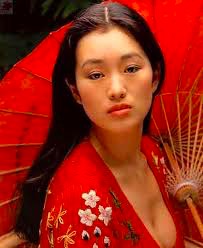Gong Li, the empress of Chinese film
Illustration by Derek Zheng

Is there a better showcase than the opening of Zhāng Yìmóu’s 张艺谋 masterpiece, Raise the Red Lantern? A young woman is admitting defeat to a faceless stepmother. All right, she says, she’ll get married. Her face is a mask, unblinking downcast eyes telling us everything and nothing. A shining tear duct marks the start of the facade’s collapse, revealing a woman of strength and determination pummeled by an ancient system far stronger than she. But her expression never breaks. “Let me be a concubine. Isn’t that a woman’s fate?”
It takes a certain type of talent to convey not just a poker face, but the character raging behind it. That’s Gǒng Lì 巩俐.
Who is Gong Li?
There are many reasons why Gong Li, 54, has earned the nickname “Empress Gong” (巩皇 gǒng huáng). She’s a source of national pride. She was at the forefront of China’s “Fifth Generation” films of the late 1980s and 1990s, landing leading roles in essential viewing such as Red Sorghum, Raise the Red Lantern, and Farewell My Concubine. She’s the second actor in history to win the highest award at all three European film festivals (Cannes, Venice, and Berlin) and been given the “Queen” treatment at Cannes, honored with the entirety of the red carpet for a precious few uninterrupted minutes. In 1996, she was the first Chinese actor to appear on the cover of Time Magazine.
Other stars in China are merely “kings” (天王 tiānwáng) or “queens” (天后 tiānhòu), but no one else has ascended so close to heaven. Not for nothing has she been hailed by American producers as “the Meryl Streep of China.”
Gong Li is best celebrated among those born during the 1980s. In the 1990s and early 2000s, she won a major award almost every year. She is a driven, determined woman (self-described as “stubborn”) who has overcome many obstacles to get where she is today, and still takes her craft seriously despite her many laurels. In an industry where older women are often pushed out, Gong Li earned the title “most beautiful woman” in 2006, at age 40.
Gong Li was born on the last day of December in 1965 in Shenyang, Liaoning Province, the youngest child of an economics professor. Although desperate for a singing career, she failed to get into Beijing’s top music school in 1985. Instead, she applied for and was admitted to the prestigious Central Academy of Drama in Beijing.
But it was a rocky road: she failed the entrance exam two years straight, and her parents stopped funding her. She worked at a publishing house by day and studied by night for two years. Although 11 points short of the required result for admittance on the third attempt, she was given an exception as a “special admittance” by one teacher who believed she had talent.
Perhaps this struggle to get in made her hungry for more — she started auditioning even before she left drama school. While still in her second year, she hit the jackpot: the starring role in Red Sorghum, the first film of Fifth Generation maestro Zhang Yimou. During casting, Mò Yán 莫言 (author of the film’s literary namesake) didn’t believe she fit the character he had in mind, a shy young woman shunted by circumstance into running a rural Shandong distillery. But Zhang Yimou thought differently, lured by her charisma and “motherly beauty.”
Fifth Generation films generally fared poorly in the domestic box office. Chinese audiences preferred Hong Kong action films, TV dramas, or the comedic holiday fare (贺岁片 hè suì piān) from the likes of Féng Xiǎogāng 冯小刚. But Red Sorghum had buzz. Before its domestic release, it won the Golden Bear at the Berlin Film Festival. Naturally, everyone wanted to know what the fuss was about. The film sold 75 million tickets in 1988 and 1989, catapulting Zhang Yimou and Gong Li to fame. The two fell in love (even though Zhang was married) and began a long career partnership that only ended with their personal separation in 1994.
Li is comfortable in all sorts of roles, from slack-jawed peasant quietly seeking redress in The Story of Qiu Ju to diva Empress bent on revenge in The Curse of the Golden Flower. But she has a type — strong, unyielding women crushed by the cruel world they live in. They end up betrayed by their husband or unable to remember them, wracked with the pangs of guilt or heartbreak, banished or homeless, mad or dead.
Perhaps it takes one to know one. Time and again, Li has proved her own strength, especially when training for her characters. In the months prior to filming Red Sorghum, she went to live in Shandong and practiced picking up and carrying water in buckets every day, hoisting the water on a pole over her shoulder so often she had to swap because one got so worn out. She went to live the life of a Shaanxi peasant for several months in preparation for Qiu Ju, using special shampoo that roughened her hair and filming one scene in minus-20 Celsius, fainting once cameras stopped rolling. Although the director didn’t ask her to, she practiced 2,000 times a day for five months to master a split-second fan trick in Memoirs of a Geisha.
That film saw Gong Li in a supporting role alongside Zhāng Ziyí 章子怡, Zhang Yimou’s new muse. The slap at the end of the above clip is real, as the two women agreed it would make for a better performance. There has been much press and speculation over the years about the two being rivals, but many affectionate public encounters between the two have debunked those rumors.
Gong Li has successfully dipped her toe into Hollywood several times, working alongside Colin Farrell and Jamie Foxx as the cool and forceful girlfriend of a drug lord in Miami Vice and as Hannibal Lecter’s aunt in the critically reviled Hannibal Rising. Later this year, she’s set to appear as the villain Xianniang in Disney’s live-action Mulan.
Although best known in the West for her work in Fifth Generation films, her career is a star-studded and diverse one in China. Take the much-anticipated Leap, one of this year’s delayed Spring Festival films, which sees Emperor Gong sporting the frizzed bob-cut and no-nonsense glasses of Láng Píng 郎平, coach of the highly successful and much-loved Chinese women’s volleyball team. Who better to act out Chinese victory than the woman who conquered the red carpet?
Chinese Lives is a weekly series. Previously:






